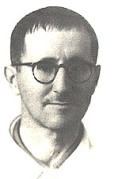Skip to: site menu | section menu | main content
Welcome To Democracy And Socialism .Com
Things should be made as simple as possible, but not any simpler- Albert Einstein
Bertolt Brecht (1898-1956) |
 |
Bertolt Brecht is one of the greatest figures in 20th century theatre. A theatrical reformer who did not want his audience to become emotional, but to think. He developed a from of drama called epic theatre in which ideas or didactic lessons are important. He also was a great poet which is reflected in his plays, they contain rare poetic vision, a bold and direct simplicity, which has rarely been comparable in our time.
Brecht was born in Augsburg, a part of the Bavarian section of the German empire. He began to write poetry as a teenager. His first poems were published in 1914.
He was well aware of the poverty and misery of the German working class and deprived. The Bavarian revolution of 1919 had a great impact on him. At that time he joined the Independent Social Democratic Party. In 1933, with the rise of Nazi rule in Germany, Brecht books and plays were banned; performances were interrupted and forbidden by the police. He left Germany first to Denmark and then to Finland, Soviet Union and from there to the United States.
In 1942, he settled in Santa Monica, and tried to write for Hollywood, but as he complained, “the intellectual isolation here is enormous”.
In 1947, Brecht was accused of being a member of the U.S. Communist Party, but he confused J. Parnell Thomas – the Chairman of the House Committee on Un-American Activities – by telling half truths, and flew to Switzerland the next day. When he was in Switzerland, he was horrified at the reinstatement of the former Nazis into West German Government. In 1948, after 15 years of exile he returned to The Democratic Republic of Germany and founded his own Marxist theatre, the Berliner Ensemble. But he was uneasy with the policies of D.R. of Germany, because he truly believed that democracy and socialism are inseparable. He acquired his Austrian citizenship to secure his travels. Brecht’s life in East-Berlin was very fruitful. He became the most popular contemporary poet and playwright outdistanced only by such classics as Shakespeare, Schiller and Goethe.
In 1954, Brecht received the International Lenin Peace Prize. He died of a heart attack prompted by his congenital heart condition.
Brecht’s most famous works are:
- BAAL (1918)
- In the Jungle of the Cities / in the Swamp (1921)
- Man is Man (1924)
- The Threepenny Opera (1928)
- He Who Says Yes (1929)
- He Who Says No (1930)
- The Exception and the Rule (1930)
- The Seven Deadly Sins (1933)
- Fear and Misery in the Third Reich (1935)
- Galileo (1938)
- Mother Courage and Her Children (1939)
- The Good Person of Stezuan (1940)
- Schweik in the Second World War (1941)
- The Days of the Commune (1948)
- Report from Herrnbuger (1951)
- The Trial of Joan of Arc at Rouen, 1431 (1952)
- Coriolanus (1952)
- Trumpets and Drums (1955)